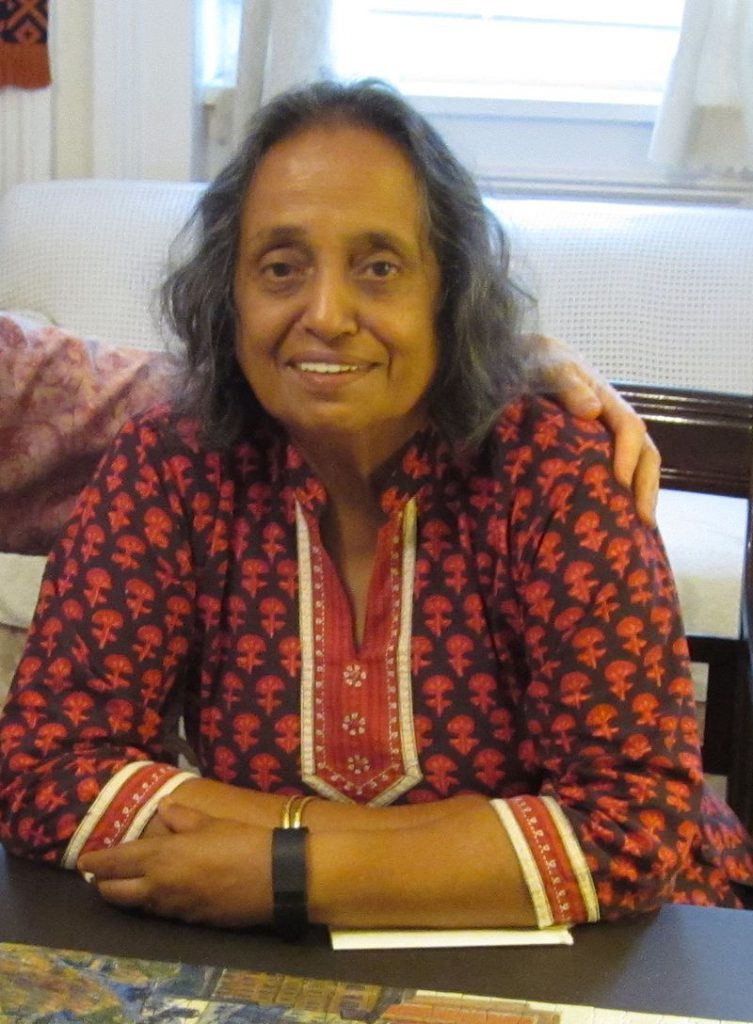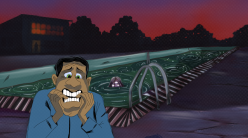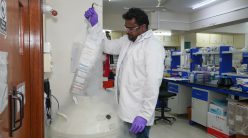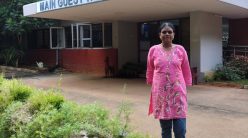The mathematician and former dean on her growth at IISc

Put it in any way you like – (a) from the beginning to the end, or (b) from the start to finish or (c) from alpha to omega – of my active research life was spent at the Indian Institute of Science. I entered as a meek, diffident research student in 1965 and left as a not-so-meek, not-so-diffident researcher in 2005. Certainly, these 40 years were the best years of my life. Looking back on these years is a pleasure, more so as I have erased all that I do not want to remember with one click of the “Delete” button of my memory.
What do I remember of the sixties? The figure that looms up first is that of Prof PL Bhatnagar, the founder Chairman of the then “Applied Mathematics” Department. He was formidable and overpowering – mentally, physically, and spiritually. He was a strict taskmaster, who could breeze into our “cubby hole” offices in the now extinct “Director Bhagvantam’s Lab” (which was the Applied Mathematics Department) at any time he chose and demand what we have accomplished since he last reviewed our work. He was also a father figure, who took care of us with as much (if not more) attention and affection than he lavished on his own children.
Another scene that flashed in my mind is that of the Ladies Hostel – now demolished, known lastly as the J Block or affectionately as “Old Ladies Hostel”. It was a sprawling building housing 20 or so female research students. It had a patch of green in the inner quadrangle, where we amused ourselves before the days of TV by jumping rope or playing badminton. The best among us could skip rope up to 1000 times without a pause. One of the constant features in the hostel was the row of soap boxes in front of the bathroom, the one with the geyser. This gave one the right to be ahead in the morning queue to take bath. Those who worked late in the laboratories were at a distinct advantage because any soapbox placed after midnight gave its owner the right to access. Along with the hostel, one remembers the messes – the vegetarian mess (later A mess) and the non-vegetarian mess (later B – NV mess). In the NV mess, Wednesday nights were special with dosa and half a grilled chicken – with the champion consuming up to 20 dosas. The servers knew each of us personally and we were all a part of one large family.
There were special dinner days – where we ate a fare, which was truly royal, under the full moon outside. At a princely rate of Rs 3 a day, we had a truly well run mess with all that one could wish for. Besides, the lady students were at a distinct advantage. For the almost 1000 men students, we were around 20 women students. The ratio was certainly in our favour. For the almost 1000 men students, we were around 20 women students.
For the almost 1000 men students, we were around 20 women students
As for the department, we were a small group with one Professor, one Assistant Professor, a handful of lecturers, and a whole bunch of enthusiastic research students. Since many of us had taken up research problems which involved numerical computations, we had to spend hours cranking the hand-operated “Facit” machine. The more adventurous among us, who took up large computational work, had tomake the trip to HAL, where the sole computer in Bangalore was situated. This involved a long and tedious bus journey – much like the pioneers – and sometimes carrying a bed roll to spend the night there, if required. A very precious piece of equipment carried along was rolls and rolls of paper tape carefully punched on the punching machines at IISc and which had to be protected from any kind of damage during the arduous bus journey. The more tech savvy among us could simply unscroll and read these rolls with ease and staring at the punch holes could tell us where a sign was missing or a character had been wrongly typed.
At the department there was a constant stream of foreign visitors. One of the frequent visitors was Prof Kampe de
Feriet, a kindly old Professor from France. There was Prof AR Robinson from Harvard, who introduced Oceanography to the department, Prof Collatz, the Numerical Analysis Professor from Hamburg, Germany, Prof (later Sir) M James Lighthill, the aerospace expert, who was later the Lucasian Professor at Cambridge University, to name a few. Another frequent visitor was Sir CV Raman, who was very disappointed that none of us students were colour blind. There was a very close relation with the Mathematics Department at Central College, especially with the late Prof Noronha. Prof Bhatnagar and his entire entourage of faculty and students would make trips to Central College to attend seminars, lectures, or workshops. Bhatnagar also had close links with Prof Narasimhaiah of National College. He believed that if you lived and worked in a city, you must make a difference to it.
Getting a PhD was a big affair. The entire department would gather in the lecture hall for tea and the new doctor would be given a gift. I still treasure the foldable bookstand that I got on the occasion. After the degree was given, each one was encouraged to go abroad for a postdoc. Each of the foreign visitors was requested to support a postdoc. It was almost like a world family, where you moved from one house to another in a different continent.
Getting a PhD was a big affair. The entire department would gather in the lecture hall for tea and the new doctor would be given a gift.
Besides the many classes and lectures we attended, the “fun” class was the foreign languages class, a pass in which was the prerequisite for taking the comprehensive examination. Three languages were offered – French, German, and Russian. The French and German classes were full, so some of us opted for Russian, where there were only about ten students. Learning the Cyrillic script was not difficult and most of us considered the class as a respite from an otherwise tough life. However, there was one among us who took the class in real earnest. Every Russian word would bring out a question – “How is it related to the following German word?” or “Is the root in the following Latin word?” One of the lessons in the Russian text was translated as “Charlie is a good student.” So this particular student was affectionately called Charlie.
As the years rolled on, life changed. Some of the changes were for the better, some were not so good. Forty years is a long time in the life of an individual, and as far as IISc is concerned, it was a sizeable part of its life as well. Watching the scene change and being part of this change was a privilege for me.
“Little drops of water, little grains of sand
Make the mighty ocean and the pleasant land.”
So whatever we have contributed to the image and stature of IISc, may it add in a small, but not insignificant way, to its glory.
Renuka Ravindran was a professor at the Department of Mathematics.
Ravindran’s account in “Reminiscences” was published by IISc’s Archives and Publications Cell in 2008. For more stories in this series, follow these links:




